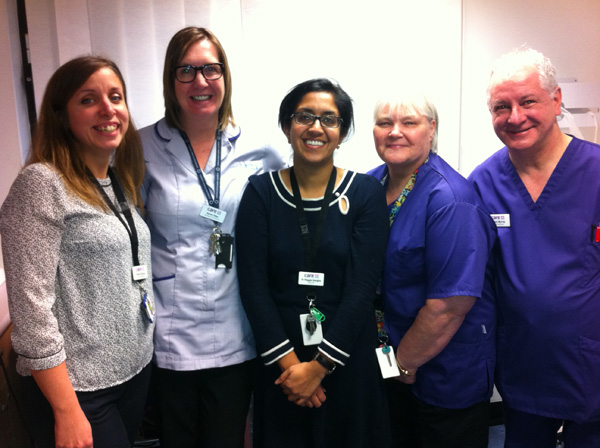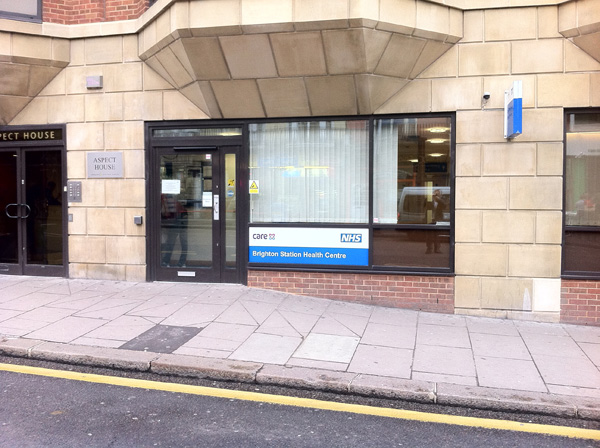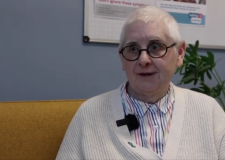News: An urgent case for treatment

Pic: Brighton Station Walk-In Centre medics Emma George, Sarah Allen, Reggie Sangha, Annette Fletcher and Bill Murray
Health chiefs across Brighton and Hove are trying to avoid a repeat of the problems in A&E last winter. Frank le Duc visits one of the alternatives
Doctors and health officials in Brighton and Hove have been planning for the “winter surge” – the rise in patients as temperatures drop. They have offered reassurance to patients groups, politicians and others that lessons have been learnt since last winter when parts of the NHS showed signs of strain. In particular, the Accident and Emergency (A&E) Department at the Royal Sussex County Hospital in Brighton faced significant difficulties.
This winter patients are being reminded that A&E is for genuine accidents and emergencies. It is also being pointed out that painful or annoying conditions such as hangovers, flu and constipation can all be treated elsewhere more quickly and more appropriately. Elsewhere includes the Brighton Station Walk-In Centre.
Monday 9th December was the second anniversary of the closure of the Victoria NHS Walk-In Centre by the railway station in London. It was used by, among others, commuters from Brighton and Hove who struggled to make it to their own doctor during the working week. A report by the NHS watchdog Monitor last month said that more than 50 walk-in centres had been closed although about 180 are still treating patients and most are proving popular.
Those that remain include the Brighton Station Walk-In Centre, in Queen’s Road, about a hundred yards from the front of the station. It opened in 2009.

Reggie Sangha, the lead GP, said: “There have been a lot of reports about walk-in centres closing and it’s caused some confusion. I’ve been asked whether we’re closing. We’re not. We have had our contract extended for a further year.”
The report by Monitor said that walk-in centres were popular with patients and proving a practical alternative to busy hospital accident and emergency (A&E) departments. Monitor also said: “While walk-in centres were established primarily to provide and improve access to primary care, our conversations with stakeholders and other evidence suggests that many in the sector view the main purpose of walk-in centres as reducing pressures on A&E departments.
“There are efforts under way to better manage demand for services. For example, NHS England is reviewing how urgent and emergency care are organised. The review aims to develop a framework for better managing demand while ensuring that people have access to 24/7 care for urgent medical needs. Urgent care review boards are also being formed in every community to review and develop local plans to improve urgent and emergency care.”
SURGE PLANNING
Locally, the Brighton and Hove Urgent Care Programme Board has been involved in “surge planning”, supported by the Urgent Care Task Force. Their efforts are intended to prevent a repeat of the problems last winter. The A&E department at the Royal Sussex struggled at times. And earlier this year national experts were brought in to help.
The Care Quality Commission (CQC), another national health watchdog, set out a number of criticisms in an official report. A great deal of work has been taking place all year to improve the situation and prevent a repeat this winter.
One local health organisation, the Brighton and Hove Clinical Commissioning Group (CCG), has even started a campaign to persuade people not to go to A&E unless it’s a genuine emergency.
The CCG is urging people to “be a hero and help save A&E for saving lives”. It said: “Admissions to the emergency department always rise in winter with people suffering from winter-related illnesses and accidents. Many of these people desperately need the life-saving treatment which the Royal Sussex staff offer.
“However, nationally it is noted that one third of the people who go to the emergency department don’t need to be there. Brighton and Hove CCG therefore wants to raise the profile of the other services available to people living in the city and to celebrate those people who make the right choices and get their problems treated in the right place for them.”
“We have an important part to play in helping to reduce attendances at A&E”
These include the walk-in centre, family doctors (also called GPs) and pharmacies. CCG chairman Xavier Nalletamby said: “Already this year the Royal Sussex has seen people at A&E with toothache, constipation, hangovers, flu and bee stings – all painful or annoying problems but not ones needing to be treated by emergency staff. Remember when you don’t choose A&E the service is able to concentrate on people suffering from strokes, heart attacks and other life-threatening illnesses.”
Dr Nalletamby has concerns about budgets. The current contract means that it costs more to treat a patient at the walk-in centre although it is cheaper than A&E. Then again, the walk-in centre is open from 8am to 8pm every day of the week – in fact, every day of the year – unlike any GP surgery in Brighton and Hove.
INFECTIOUS STRAIN
One of the difficulties most years is that people turning up at the Royal Sussex with flu or norovirus – sometimes described as the winter vomiting bug – have proved infectious. And while other patients pick up the bugs so do staff. The situation is not helped by the old Royal Sussex buildings which were designed to house open wards where germs spread more easily than in hospitals with modern smaller bays.
Plans to demolish the oldest buildings and replace them with 21st century buildings will help tackle the spread of bugs. It will also lead to the loss of fewer beds when there is an outbreak of an infectious condition. In the meantime, doctors, nurses and support staff invariably end up being off work sick placing wards under strain. And where agency staff can be found it adds to the pressure on budgets. At least the flu vaccination rate among frontline staff has risen markedly this year.
Given the realities at the Royal Sussex and concerns about the closure of walk-in centres elsewhere, some have expressed relief about the extension of the contract for the Brighton Station Health Centre. One local politician said: “I went there because my GP couldn’t see me. They saw me straight away and were very good.” He said that he intended to register with the Brighton Station practice. Official figures suggest that he will be joining more than 5,000 others who have done the same in just a few years.

The conventional family doctor or GP surgery and the walk-in centre are two services provided next to Brighton Station by Care UK. The site also houses a sexual health clinic. One reason is that Brighton and Hove has the highest prevalence of people living with HIV outside London.
The Monitor report said: “The government wanted to improve access to primary care because of concerns that people sometimes found it difficult to access health care quickly from general practice. The requirement to register with a GP practice close to home, in particular, was thought to present barriers to access for certain groups, including commuters, the homeless, tourists and travellers. All those groups are represented in Brighton and Hove.
SAFEST AND BEST
Some of their feedback is included in a CQC report which was published in May and said that the walk-in centre met every standard on which it was assessed. One patient is quoted telling the watchdog: “I like it here, more than my own doctor’s really. I like to be listened to, and I like to have the choice that if I didn’t think it was any good, then I would go elsewhere, but right now I feel this is the safest and best place in Brighton to come to.”
Care UK said: “We combine a traditional family GP practice, a walk-in centre and sexual health services. We are open every day, including bank holidays, from 8am to 8pm, although our sexual health service closes at 7pm.
“Registered patients can book appointments with a GP within 48 hours and we offer all the usual GP services, including vaccinations and immunisations, diabetic management, asthma support, help to stop smoking, weight loss, blood pressure, heart disease, stroke support and cervical screening.
“Our walk-in centre allows people with busy lifestyles to be seen for minor illnesses and injuries without an appointment. Our discreet sexual health clinic offers completely confidential advice and offers treatment and screening for a range of sexual health issues.”
Dr Sangha said: “We’re not here for repeat prescriptions or routine referrals to a specialist. And we’re not here to take the place of a patient’s GP.” She added: “We have an important part to play in helping to reduce attendances at A&E. And we’re working closely with the CCG to help it meet its aims in reducing unnecessary attendances at A&E.”



















